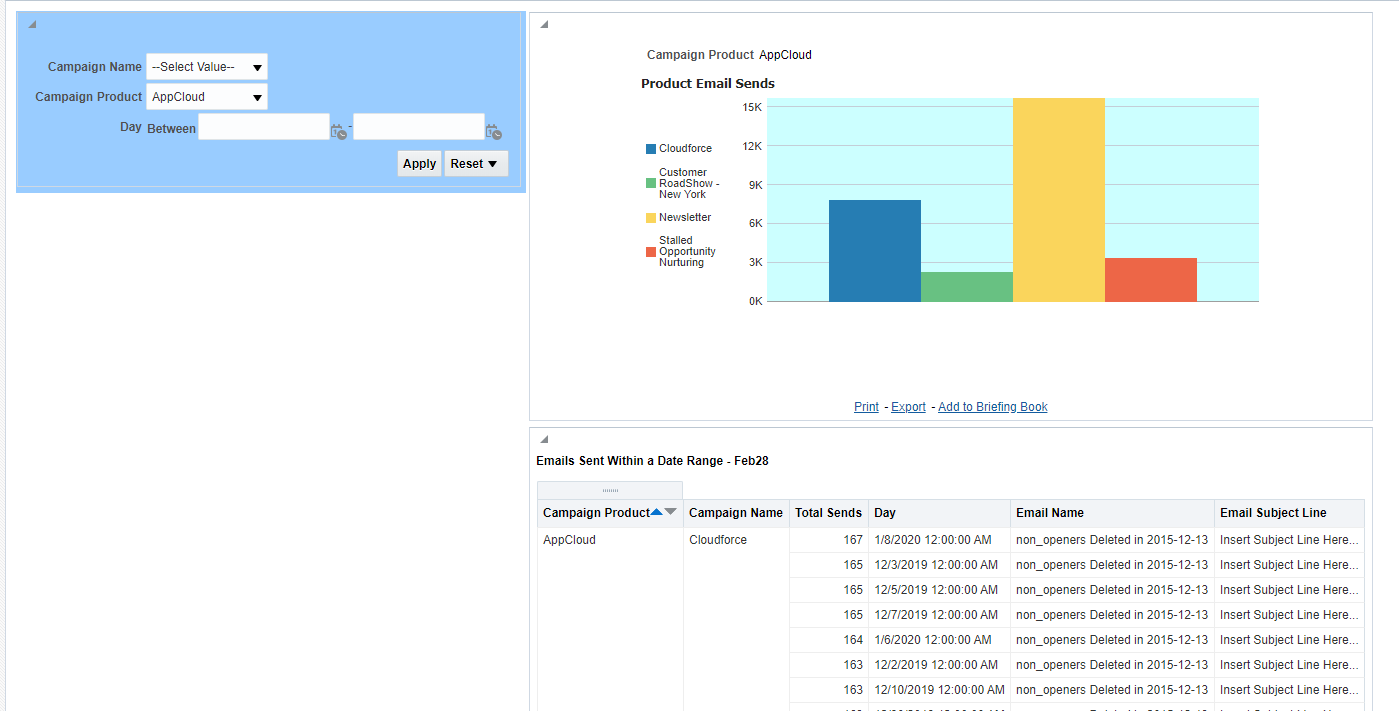
Oracle Eloqua: Complete Buyer's Guide
Enterprise-grade AI lead scoring through Advanced Intelligence Cloud Service
Oracle Eloqua delivers enterprise-grade AI lead scoring through its Advanced Intelligence Cloud Service, combining predictive analytics, behavioral tracking, and generative AI capabilities within Oracle's unified CX ecosystem[39][41].
Market Position & Maturity
Market Standing
Oracle Eloqua occupies a top-tier enterprise position within the marketing automation market alongside Adobe Marketo and Salesforce Einstein, with distinct competitive advantages emerging from Oracle's unified CX ecosystem[47].
Company Maturity
The platform benefits from Oracle Corporation's substantial enterprise infrastructure and long-term market presence, providing buyer confidence in vendor stability and continued platform investment.
Industry Recognition
Industry recognition emerges through documented customer implementations across manufacturing (Hyster-Yale), media (Bonnier), and industrial sectors (Fluke), demonstrating market validation in complex B2B environments[48][49].
Strategic Partnerships
Strategic partnerships and Oracle's broader enterprise relationships provide market stability and continued platform development resources.
Longevity Assessment
Long-term viability benefits from Oracle's enterprise market position and continued investment in AI capabilities. The platform's integration within Oracle's unified CX ecosystem provides strategic protection against competitive displacement[47].
Proof of Capabilities
Customer Evidence
Hyster-Yale achieved 31% higher Marketing Qualified Lead conversion rates and 11% overall lead-to-opportunity growth through automated scoring workflows in a documented 90-day implementation[49].
Quantified Outcomes
Email performance validation includes 63% email open-rate improvements through AI-scheduled delivery optimization and 45% reduction in opt-outs via engagement-based frequency capping[42][47].
Case Study Analysis
Bonnier Media reported significant year-over-year inbound registration growth after deploying multiple lead scoring models through Oracle Eloqua's Advanced Intelligence platform[48].
Market Validation
The consistent pattern of documented success across different industries provides evidence of platform reliability and effectiveness for appropriate customer profiles.
Reference Customers
Documented customer implementations include Hyster-Yale, Bonnier Media, and Fluke, demonstrating effectiveness across manufacturing, media, and industrial sectors[48][49].
AI Technology
Oracle Eloqua's Advanced Intelligence Cloud Service represents a sophisticated AI architecture that processes multi-touchpoint behavioral data across web interactions, email engagement, and firmographic attributes to generate dynamic lead scores ranging from A1 (high intent) to D4 (low intent)[39][41].
Architecture
Integration architecture centers on Oracle's unified CX ecosystem, providing native integration with Oracle's sales and service clouds that enables shared data infrastructure competitors accessing through APIs cannot match[47].
Primary Competitors
Adobe Marketo and Salesforce Einstein[47].
Competitive Advantages
Competitive strengths include the Advanced Intelligence Suite's combination of predictive scoring, generative AI, and send-time optimization within a single platform[37][38][47].
Market Positioning
Enterprise market positioning places Oracle Eloqua within the top tier alongside Adobe Marketo and Salesforce Einstein, with distinct competitive advantages emerging from Oracle's unified CX ecosystem[47].
Win/Loss Scenarios
Win/Loss scenarios favor Oracle Eloqua for organizations already invested in Oracle's CX ecosystem, particularly those requiring sophisticated account-based marketing capabilities[38][47].
Key Features

Pros & Cons
Use Cases
Integrations
Pricing
Featured In Articles
Comprehensive analysis of AI Lead Scoring for AI Marketing & Advertising for AI Marketing & Advertising professionals. Expert evaluation of features, pricing, and implementation.
How We Researched This Guide
About This Guide: This comprehensive analysis is based on extensive competitive intelligence and real-world implementation data from leading AI vendors. StayModern updates this guide quarterly to reflect market developments and vendor performance changes.
51+ verified sources per analysis including official documentation, customer reviews, analyst reports, and industry publications.
- • Vendor documentation & whitepapers
- • Customer testimonials & case studies
- • Third-party analyst assessments
- • Industry benchmarking reports
Standardized assessment framework across 8 key dimensions for objective comparison.
- • Technology capabilities & architecture
- • Market position & customer evidence
- • Implementation experience & support
- • Pricing value & competitive position
Research is refreshed every 90 days to capture market changes and new vendor capabilities.
- • New product releases & features
- • Market positioning changes
- • Customer feedback integration
- • Competitive landscape shifts
Every claim is source-linked with direct citations to original materials for verification.
- • Clickable citation links
- • Original source attribution
- • Date stamps for currency
- • Quality score validation
Analysis follows systematic research protocols with consistent evaluation frameworks.
- • Standardized assessment criteria
- • Multi-source verification process
- • Consistent evaluation methodology
- • Quality assurance protocols
Buyer-focused analysis with transparent methodology and factual accuracy commitment.
- • Objective comparative analysis
- • Transparent research methodology
- • Factual accuracy commitment
- • Continuous quality improvement
Quality Commitment: If you find any inaccuracies in our analysis on this page, please contact us at research@staymodern.ai. We're committed to maintaining the highest standards of research integrity and will investigate and correct any issues promptly.